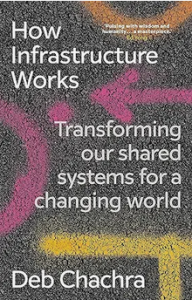How Infrastructure Works by Deb Chachra is a good complement to Brett Frischmann’s now-classic Infrastructure, which has more of a focus on the economic analysis. Chachra is an engineer, which leads to her focusing more on the physical aspects and affordances of the technologies involved. Having said that, there were two aspects of the book I really appreciated. One is that she links access to infrastructure to Sen’s capabilities approach, and the fact that it gives people agency to lead their lives as they see best. It is also progressive – those with fewer private assets get more value out of public assets.
The other is the emphasis on the collective character of infrastructure assets – which is one reason my colleagues and I recently called for a Universal Basic Infrastructure (rather than income, or even services, both of which involve an individual perspective). The ability of a society or community to invest in and indeed maintain infrastructure – now very complicated and multi-layered – is a thermometer of its political and social health. Something Chris Arnade recently pointed out with regard to the US: decaying transport system, declining polity.
As Chachra points out, the lens of economic efficiency is inadequate. It leads to under-investment in systems that need redundancy, to create resilience at all, and all the more necessary now to enable the needed energy transition.
She’s optimistic about the possibility of shifting to green energy – more so than Brett Christophers in his excellent forthcoming book The Price is Wrong – perhaps because Chachra assumes the state will undertake a lot of the needed investment. Although she adds, “Stability of all sorts, including political and economic stability, is what makes it feasible to front-load large investments of resources with the expectation of continuing benefits over a long period.”
“The true value of these [infrastructure] systems is literally incalculable … because they enable systems and behaviours that wouldn’t be possible without them,” she writes. Above all, what I like about the book is its recognition that “the political and the engineering questions are inextricably linked.” I’ve been slightly obsessed with the dysfunction of applying cost-benefit analysis to major infrastructure, and the need to maintain and upgrade it to at least mitigate deep spatial inequalities. Bennett Institute colleagues have worked on social infrastructure and we have a new British Academy project on a measurement framework for social and cultural infrastructure. The term has recently been more widely used, and perhaps the definition needs revisiting. But the focus on the collective rather than the individual, on the future not just the immediate present, and on the inadequacy of the static efficiency lens when we need an “ethics of care rather than utilitarianism”, is surely correct.
The Guardian had a taster essay extracted from the book, but it is well worth a read as a whole. It’s thoughtful, informative and also very well written.

